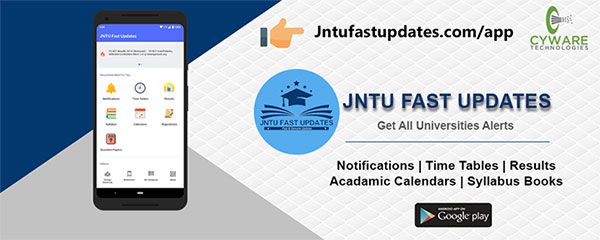JNTUK R19 2-2 Java Programming Material/Notes PDF Download
Students those who are studying JNTUK R19 CSE Branch, Can Download Unit wise R19 2-2 Java Programming Material/Notes PDFs below.

JNTUK R19 2-2 Java Programming Material/Notes PDF Download
OBJECTIVES:
- To identify Java language components and how they work together in applications
- To learn the fundamentals of object-oriented programming in Java, including defining classes, invoking methods, using class libraries.
- To learn how to extend Java classes with inheritance and dynamic binding and how to use exception handling in Java applications
- To understand how to design applications with threads in Java
- To understand how to use Java APIs for program development
UNIT-1
Program Structure in Java: Introduction, Writing Simple Java Programs, Elements or Tokens in Java Programs, Java Statements, Command Line Arguments, User Input to Programs, Escape Sequences Comments, Programming Style.
Data Types, Variables, and Operators: Introduction, Data Types in Java, Declaration of Variables, Data Types, Type Casting, Scope of Variable Identifier, Literal Constants, Symbolic Constants, Formatted Output with printf() Method, Static Variables and Methods, Attribute Final, Introduction to Operators, Precedence and Associativity of Operators, Assignment Operator ( = ), Basic Arithmetic Operators, Increment (++) and Decrement (- -) Operators, Ternary Operator, Relational Operators, Boolean Logical Operators, Bitwise Logical Operators.
Control Statements: Introduction, if Expression, Nested if Expressions, if–else Expressions, Ternary Operator?:, Switch Statement, Iteration Statements, while Expression, do–while Loop, for Loop, Nested for Loop, For–Each for Loop, Break Statement, Continue Statement.
Download UNIT-1 Material PDF | Reference-2
UNIT-2
Classes and Objects: Introduction, Class Declaration and Modifiers, Class Members, Declaration of Class Objects, Assigning One Object to Another, Access Control for Class Members, Accessing Private Members of Class, Constructor Methods for Class, Overloaded Constructor Methods, Nested Classes, Final Class and Methods, Passing Arguments by Value and by Reference, Keyword this.
Methods: Introduction, Defining Methods, Overloaded Methods, Overloaded Constructor Methods, Class Objects as Parameters in Methods, Access Control, Recursive Methods, Nesting of Methods, Overriding Methods, Attributes Final and Static.
Download UNIT-2 Material PDF | Reference-2
UNIT-3
Arrays: Introduction, Declaration and Initialization of Arrays, Storage of Array in Computer Memory, Accessing Elements of Arrays, Operations on Array Elements, Assigning Array to Another Array, Dynamic Change of Array Size, Sorting of Arrays, Search for Values in Arrays, Class Arrays, Two-dimensional Arrays, Arrays of Varying Lengths, Three-dimensional Arrays, Arrays as Vectors.
Inheritance: Introduction, Process of Inheritance, Types of Inheritances, Universal Super ClassObject Class, Inhibiting Inheritance of Class Using Final, Access Control and Inheritance, Multilevel Inheritance, Application of Keyword Super, Constructor Method and Inheritance, Method Overriding, Dynamic Method Dispatch, Abstract Classes, Interfaces and Inheritance.
Interfaces: Introduction, Declaration of Interface, Implementation of Interface, Multiple Interfaces, Nested Interfaces, Inheritance of Interfaces, Default Methods in Interfaces, Static Methods in Interface, Functional Interfaces, Annotations.
UNIT-4
Packages and Java Library: Introduction, Defining Package, Importing Packages and Classes into Programs, Path and Class Path, Access Control, Packages in Java SE, Java.lang Package and its Classes, Class Object, Enumeration, class Math, Wrapper Classes, Auto-boxing and Autounboxing, Java util Classes and Interfaces, Formatter Class, Random Class, Time Package, Class Instant (java.time.Instant), Formatting for Date/Time in Java, Temporal Adjusters Class, Temporal Adjusters Class.
Exception Handling: Introduction, Hierarchy of Standard Exception Classes, Keywords throws and throw, try, catch, and finally Blocks, Multiple Catch Clauses, Class Throwable, Unchecked Exceptions, Checked Exceptions, try-with-resources, Catching Subclass Exception, Custom Exceptions, Nested try and catch Blocks, Rethrowing Exception, Throws Clause.
Download UNIT-4 Material PDF | Reference-2
UNIT-5
String Handling in Java: Introduction, Interface Char Sequence, Class String, Methods for Extracting Characters from Strings, Methods for Comparison of Strings, Methods for Modifying Strings, Methods for Searching Strings, Data Conversion and Miscellaneous Methods, Class String Buffer, Class String Builder.
Multithreaded Programming: Introduction, Need for Multiple Threads Multithreaded Programming for Multi-core Processor, Thread Class, Main Thread- Creation of New Threads, Thread States, Thread Priority-Synchronization, Deadlock and Race Situations, Inter-thread Communication – Suspending, Resuming, and Stopping of Threads.
Java Database Connectivity: Introduction, JDBC Architecture, Installing MySQL and MySQL Connector/J, JDBC Environment Setup, Establishing JDBC Database Connections, ResultSet Interface, Creating JDBC Application, JDBC Batch Processing, JDBC Transaction Management
Download UNIT-5 Material PDF
TEXT BOOKS:
- JAVA one step ahead, Anitha Seth, B.L.Juneja, Oxford.
- The complete Reference Java, 8th edition, Herbert Schildt, TMH
REFERENCE BOOKS:
- Introduction to java programming, 7th edition by Y Daniel Liang, Pearson
- Murach’s Java Programming, Joel Murach
e-Resources:
OUTCOMES:
- Able to realize the concept of Object Oriented Programming & Java Programming Constructs
- Able to describe the basic concepts of Java such as operators, classes, objects, inheritance, packages, Enumeration and various keywords
- Apply the concept of exception handling and Input/ Output operations
- Able to design the applications of Java & Java applet
- Able to Analyze & Design the concept of Event Handling and Abstract Window Toolkit


320-x100(1).gif)

Please upload unit 5 material …..exams are commencing within a week
Sir please upload 3& 4 units.there s only one week time sir
please upload 3,5 units. exams are approaching in 10 days.
Please upload unit-5
plz upload 2-2remaing units
plz open all units
PLEASE UPLOAD REMAINING UNITS
please upload unit-3 and unit-5 materials
Please upload java unit-5material sir. Please
please update remaining units
Goodmng… I need all units mateials
ok gopi sir
4th unit material mere kada sir rasindi
Please update links once again sir.
Links are not working.
When you will place the materials of another subjects please make and place in this website as early as possible then only we can prepare well
this links was not working
Yes
Download avadam ledu sir